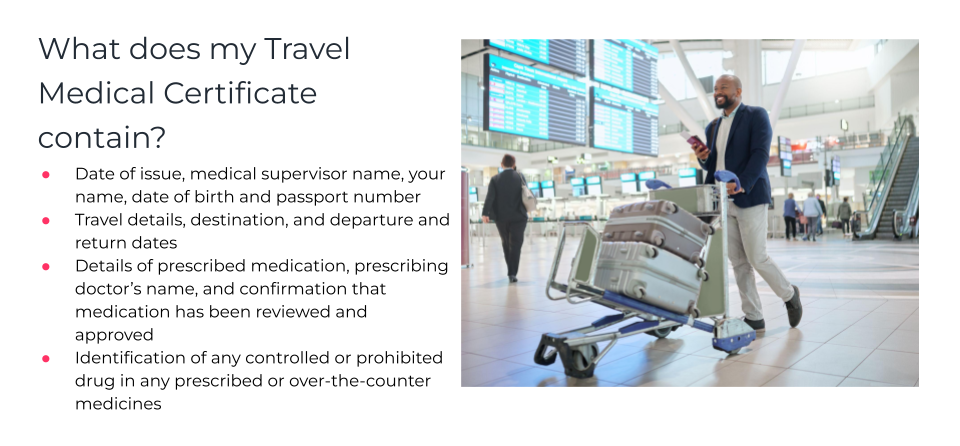DocHQ Travel Medicine Certificate: A vital addition to your pharmacy
Every year, millions of travellers abroad face the risk of hefty fines or, in the worst cases, imprisonment or deportation, due to medication restrictions in certain countries. Many common over-the-counter and prescription medications are banned or controlled in some nations, posing a significant challenge for those embarking on international journeys.
Pharmacies play a crucial role in safeguarding the health and wellbeing of their customers, and that responsibility extends to their travel plans. In addition to travel vaccinations, carrying the correct supporting documents when travelling with medicine is a necessary step. DocHQ is excited to introduce you to a powerful tool that can not only enhance your pharmacy’s service portfolio and revenue generating capacity, but also ensure the safety and satisfaction of your customers during their travels.
What are the risks when taking medication abroad?
When going overseas, many travellers may not think twice about taking medication into another country – even common over-the-counter medicines. However, organisation and planning ahead are crucial steps when carrying any medicine to countries where certain restrictions may be in place. To avoid problems while travelling, it’s important that holidaymakers check the medicine restrictions in their destination country. Here are some examples of why it’s so important…
In November 2017, 61-year-old British man Perry Coppins was jailed for five weeks in the UAE while awaiting trial for a potential four-year prison sentence for carrying prescribed anti-anxiety medication. Despite carrying paperwork from his GP for his medication, he was unaware that the six-month supply he carried for the duration of his trip exceeded the three-month limit imposed by the UAE.
Not being familiar with the laws and regulations of a country could see travellers fine, deported or worse, imprisoned. For example, when visiting a country in the Asian Pacific region, they may find certain antibiotics, antidepressants, and antimalarial drugs are illegal. Even if a traveller has a prescription from their doctor, the medication may still be prohibited from entering the country. Travelling without the correct documentation may even impact your travel insurance. Many travellers are unaware that countries impose their own rules on the types and quantities of medications allowed across their border, which may require additional documentation through the country’s embassy which can take up to 12 weeks to process.

Travel Medicine Certificate: secure travel, satisfied customers
As a pharmacy with loyal customers, it is important to go above and beyond to ensure their wellbeing. Offering DocHQ Travel Medicine Certificate is a proactive step that not only adds value to your pharmacy but also helps your customers travel with confidence, in turn increasing their confidence in you. Travel Medicine Certificate is not just a service – it provides peace of mind and a stress-free travel experience for your valued customers.
To delve deeper into how the Travel Medicine Certificate service works and discover how we can seamlessly integrate it into your pharmacy’s services, we invite you to learn more. Explore the capabilities of this powerful tool and let us guide you in offering a service that enhances your customer relationships while ensuring their safety during their travels.
To learn more about how you can integrate Travel Medicine Certificate into your pharmacy’s services and to discover all the benefits it can bring to your customers and your business, contact us today or register your interest here.



